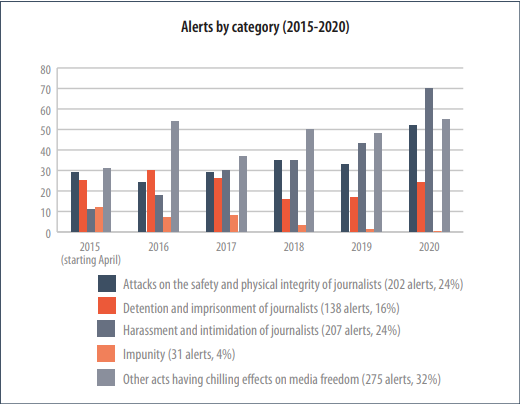By Manizja Aziz
The Safety of Journalists Platform of the Council of Europe is a platform that was established by the Council of Europe in 2015. The platform was set up with the goal to facilitate the collection and dissemination of information on serious threats to media freedom and safety of journalists in the Council of Europe’s member states. This way, the Platform seeks to better address threats and violence against media professionals, improve the protection of journalists and enhance the response capacity within the Council of Europe. Free Press Unlimited is a member of this Platform together with 13 other partner organisations.
Every year, the Platform publishes an annual report drawing on the alerts raised on the Platform and related evidence to highlight key areas of law, policy and practice where partner organisations consider that actions are urgently required. Furthermore, the partner organisations put forward concrete recommendations for actions that we believe should be taken by member states and relevant bodies of the Council of Europe to meet their obligations. Free Press Unlimited actively contributed to the development and content of this report.
In 2020 a total of 201 media freedom alerts were published on the Platform, which is the highest annual total so far recorded.

Key developments mentioned in the report are summarised below:
- COVID-19. Many governments implemented an array of measures that restricted journalists’ ability to cover the public health situation freely. This also included ‘fake news’ legislation.
- Physical attacks, harassment and intimidation. Many incidents during rallies and demonstrations were reported, as well as a high incidence of verbal attacks.
- Media capture. State-led media capture as a method to undermine independent journalism and media pluralism continued to grow in several Council of Europe countries, where governments exploited economic, regulatory and legislative competencies to discriminate against independent media and weaken their market position.
- Impunity. Since the launch of the Platform, 30 have been listed on the Platform as killed in the Council of Europe area. The lack of progress in bringing to justice the perpetrators, instigators or masterminds of murders of journalists is alarming.
- Public service media. Public service media has been facing many challenges which were amplified by the COVID-19 crisis, such as political pressure, looming funding cuts and a worrying trend of hostility and violence.
- Online harassment. A surge in online abuse and threats against journalists – especially women journalists – was seen in 2020, in several instances fuelled by politicians.
- Surveillance. Surveillance increased as part of public health measures to contain COVID-19, which may be abused and hence jeopardise journalists’ right to work privately and protect their sources.
- Online content moderation. Content moderation measures taken by states may increasingly pose a threat to freedom of expression and press freedom by outsourcing censorship to tech platforms.This may limit journalists’ access to important source material.
- SLAPPs, criminalisation of journalism, judicial harassment, misuse of law/defamation. Journalists and media workers continue to be the target of abusive legal proceedings aimed at inhibiting critical reporting, including through strategic lawsuits against public participation (SLAPPs)
You can find the full report, including the recommendations, here.
